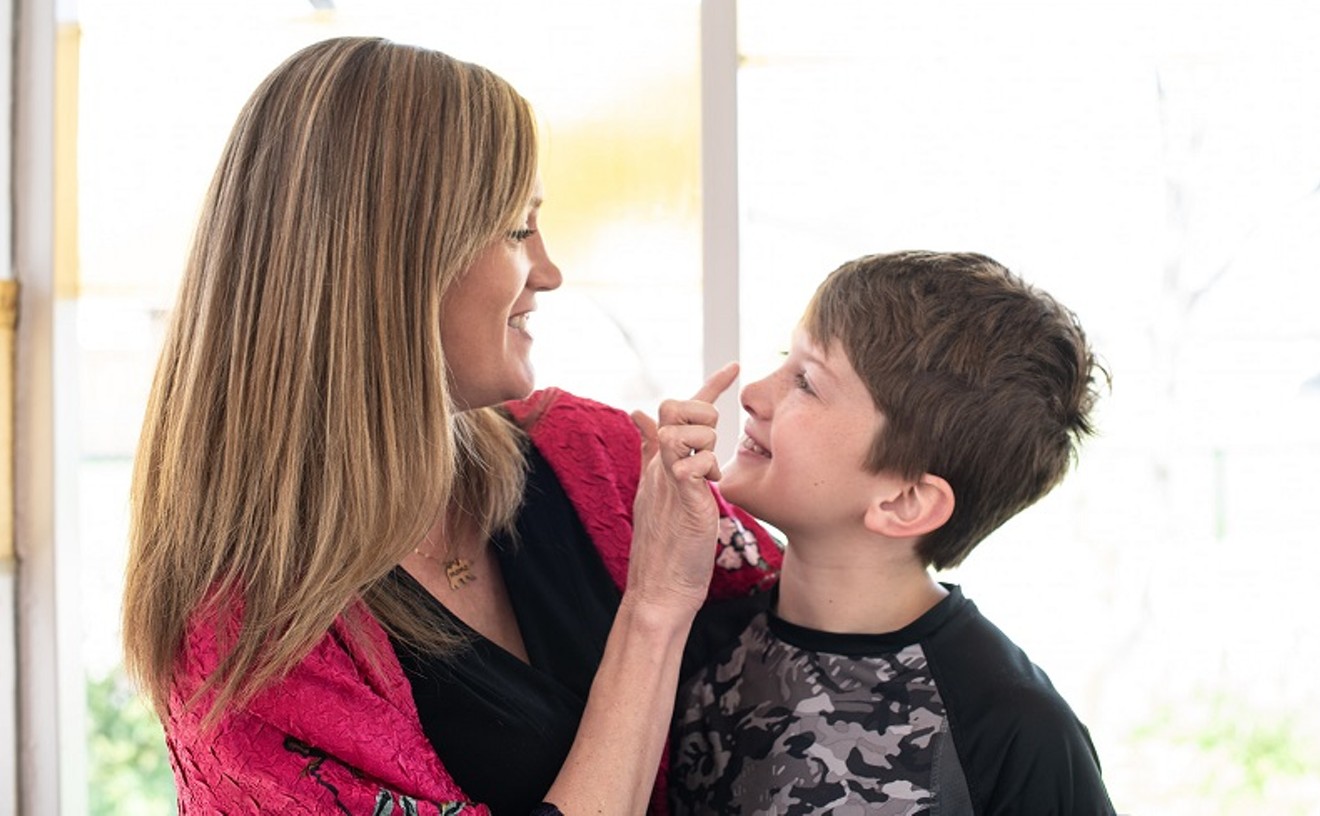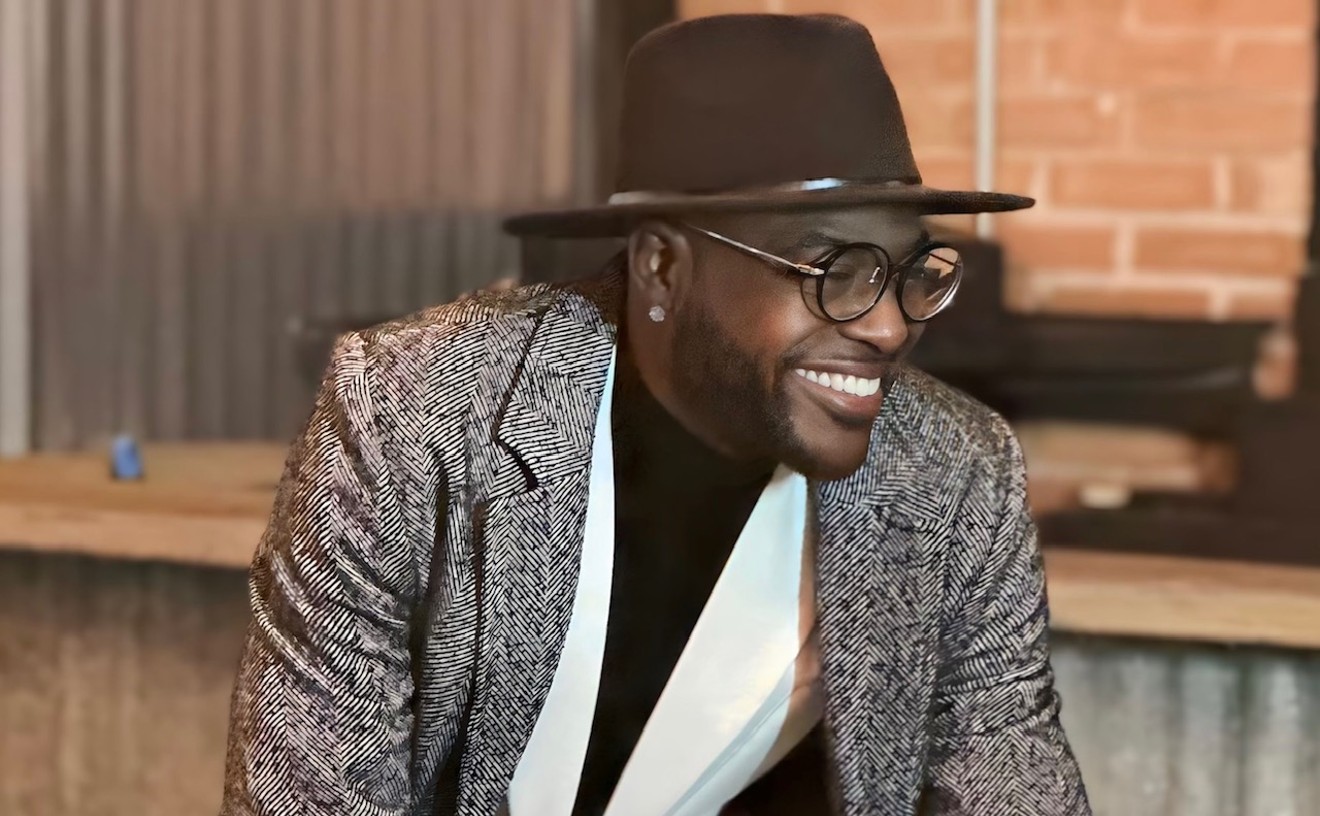If you don't think too hard about Eighteen, the centerpiece production of Kitchen Dog Theater's 2001 New Works Festival, this small, concentrated domestic drama will give you the kind of chills normally inspired by supernatural yarns. There's not a drop of ectoplasm to be found in native Texan and Southern Methodist University grad Allison Moore's play about a fragile teen-age girl who unwittingly comes between a thirtysomething married couple, but this trio lives in what could fairly be described as a haunted house. They're spooked by unfulfilled ambitions, unknown and scary futures, tragically disrupted pasts and a seeming inability to separate their desires for food, sex and love.
Director Dan Day and sound designer Sam Wagster have chosen to play innocuous sounds at loud levels in darkness and semidarkness to set the creepy mood--ice clinking in a bowl, a door creaking slowly open, heavy breathing during sex and perhaps most disturbing of all, the sound of fat frying. They're visitations of stray physical sensations, and they suggest the cravings that operate behind the polite, concerned faces in a disintegrating household.
Christine (Jill Matelan) is just a short time away from her 18th birthday and wrapping up her high school senior year. The unexpected death of her mother has landed her in the house of her uncle Dan (Max Hartman), a computer expert, and aunt Marie (Tina Parker), a nurse and amateur chef of awesome ability. Dan's on the verge of trying to sell his own allegedly revolutionary software--a virtually tamperproof program that reads fingerprints and allows only those authorized to access information--while Marie is pondering late motherhood and the possibility of opening her own restaurant.
Everyone's life in Eighteen is harried and on the brink of change, but nothing seems untoward, at first. The circumstances accumulate slowly. Christine goes to the kitchen at night to compulsively eat, drink water and immerse her hands in ice cubes. Dan's impassioned belief in his own software as savior of the Information Age veers close to obsession. And Marie cooks up ever more elaborate meals at all hours of the day, which she insists Christine eat--at first with an air of doting concern, and later with a punitive enthusiasm. As the teen-age guest spirals into despair over her thickening body, Dan and Marie's marriage shatters in a single, witnessed act of "nurturing."
Leaving aside the fact that Matelan as Christine flubbed a few cues on the Saturday night I attended, all three performers are exemplary. But Eighteen loses some of its affectingly mordant sheen the longer you ponder playwright Moore's ideas and how they do--rather, don't--fit together. Dan's privacy-preserving, fingertip-identification technology, in particular, seems an excuse to debate recent Internet-era fears about identity theft and the sanctity of personal information; it's never satisfactorily incorporated into Moore's more visceral explorations of warped body images and parental affection congealing into carnal desire. There's a peculiar variety of self-loathing that only teen-age girls seem capable of, one that leads them to cut their arms, starve themselves, regularly induce vomiting and overeat till they swell. No one has made a hard connection between these punishments and the onset of menstruation and sexual curiosity, although most people believe it's there. The playwright and Kitchen Dog Theater guide us impressively through this swampy psychosomatic hell; if only they can find ways to keep the sights along the tour pertinent and authentic to this region, then Eighteen will be an unqualified success at mapping female masochism.
"Grown-up humans is not famous for their kindness," declares The BFG, or Big Friendly Giant (Douglas Burks) to Sophie (Kelly Abbott), an orphan he's snatched from her bedroom while walking across England at midnight. His statement almost serves as a manifesto for the late children's author Roald Dahl; it certainly is the common experience of many a heroine/hero penned by the gloriously nasty English writer. The tyrannical headmistress who rules the orphanage locks Sophie in the closet as punishment--a small detail in Dallas Children's Theater's stage adaptation of Dahl's The BFG: Big Friendly Giant that makes you flinch from the unintended parallels to a recent horrific North Texas tale of child abuse. Would that kids in the real world were as resourceful and generally unflappable as Dahl's pint-sized survivors and adventurers. And yet the author never frames their perils as character-building or them as role models of superhuman courage. They merely possess a certain Anglified common sense that allows them to stand back and let the wretched adults who neglect and oppress them become entangled in grown-up vices of greed, sloth and bad personal hygiene.
The BFG: Big Friendly Giant sacrifices little of Dahl's taste for wicked cartoon sadism in David Woods' script and under Artie Olaisen's gleeful if sometimes scattered direction. Although, if I remember correctly, the author's original story contained description of the bones and blood that roaming giants with names like Meatdripper and Gizzardgulper slurp down during nightly jaunts across Europe eating citizens. The adapters have mopped up the carnage a bit, leaving The BFG to mournfully describe to Sophie the "crackety-crackety-crack" sound of the locals being munched without culinary detail about their red juices.
As the title indicates, Burks plays an exception to the typical homicidal carnivores whose footsteps make the land tremor in their wake. He's a big kid who prefers to hang around inside his cave and collect dreams in glass jars, which he screens for nightmares and, after he's assured of their soothing or hilarious qualities, redistributes them to children. By the second act, weary of having to hide Sophie from the other giants and wanting (finally) to stop the mayhem, she and The BFG enlist the aid of the Queen of England (Sue Birch) to use her military forces to corral the rampaging monsters.
The theatrical "special effect" of choice in The BFG: Big Friendly Giant is puppetry, and costumer-designer Mary McClung, a University of Dallas professor who has created for Children's Television Workshop, has whipped up a variety of puppets in scale and kind to accommodate the difference in size between Sophie and the giants. They range from a foot-tall rod puppet version of Sophie designed to look like actress Kelly Abbott, to an imposing upper body that Burks dons like a headdress to interact with Abbott herself. By my unscientific estimation, this unwieldy, goggle-eyed piece had to make Burks at least 10 feet tall. Cleverly, it was also fashioned to resemble the actor who wore it, and impressive as it is in appearance, the show drags a bit as Burks maneuvers it with some apparent difficulty. Dahl's wit works at too slashing a pace to suddenly slow down for props, however elaborate they are.
Director Olaisen wasn't able to compensate for the sluggish quality of the puppet costumes and maintain the crisp rhythm he established once an unnecessary prologue set at Sophie's birthday party is over and the actual story gets under way. The cast members who don the Maurice Sendak-ish man-eating giant headdresses, significantly smaller and more colorful than The BFG, nonetheless find themselves similarly hobbled in their onstage movements. My adult tastes preferred Birch's long-faced Queen, who reacts with utterly reserved English stoicism to even the most fantastic revelations and refers to the hungry monsters as "colleagues" of The BFG.
And yet, Dallas Children's Theater is not in the business of chasing the fancies of a childless 32-year-old man. So how did the kids react at the Saturday matinee I attended? School hasn't been out very long, and maybe many members of the junior-set could think of a better way to spend a sunny afternoon, but mostly they seemed underwhelmed, restless. I've been to productions at DCT and Le Theatre du Marionette where the performers knew immediately that they'd impressed the children with something--gasps and running commentary on the action despite parental attempts to hush it are usually signs of a bull's-eye. There was very little of either in The BFG: Big Friendly Giant, even when the flesh-eating giants turn and pretend to advance, strobe lights flickering, on the audience. The tykes were nonplussed, which leads me to paraphrase an old theatrical bromide--dying is easy; trying to manipulate a reaction out of a kid is hard.










